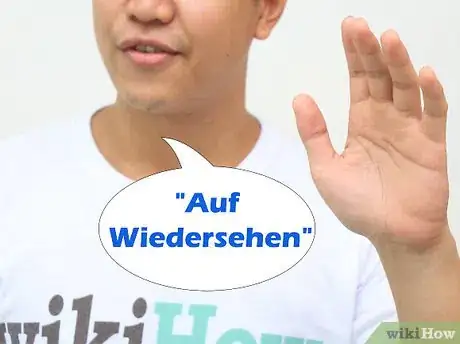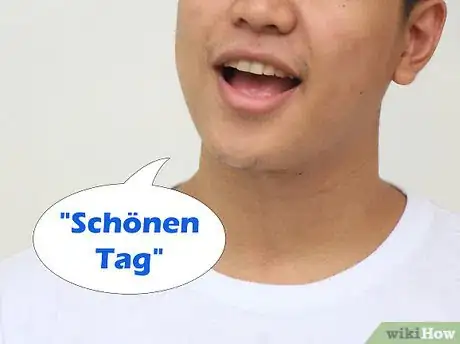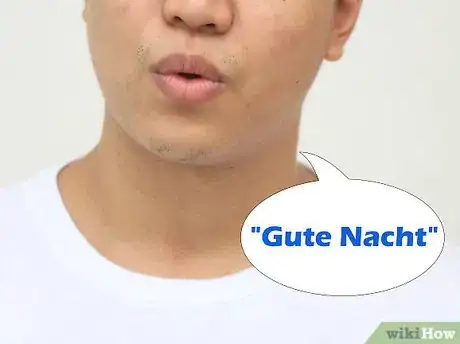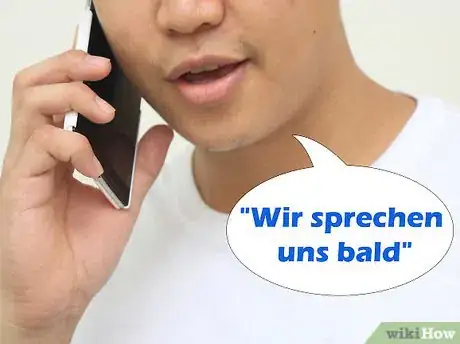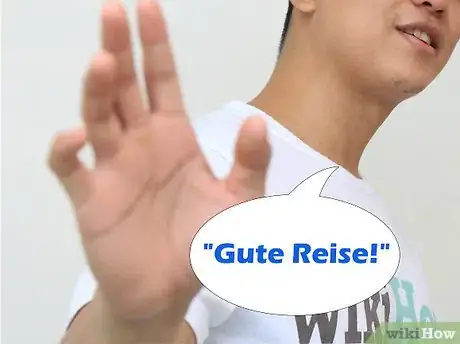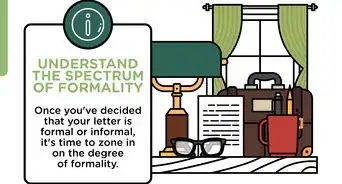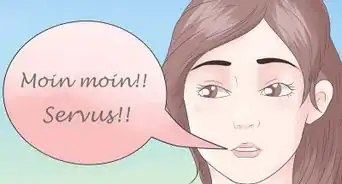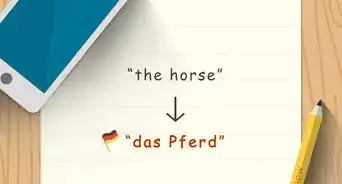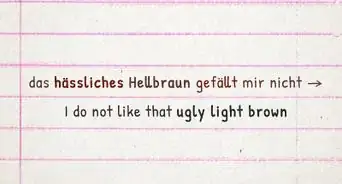wikiHow is a “wiki,” similar to Wikipedia, which means that many of our articles are co-written by multiple authors. To create this article, volunteer authors worked to edit and improve it over time.
This article has been viewed 72,744 times.
Learn more...
You can say goodbye in German in nearly any circumstance if you know two phrases: "Auf Wiedersehen" and "Tschüs." If you really want to impress native German speakers, though, there are a few other phrases you can also use when parting ways.
Steps
Part One: Standard Goodbyes
-
1Formally say "Auf Wiedersehen." This is the most formal and traditional way to say "goodbye" in German.[1]
- Pronounce "Auf Wiedersehen" as:
- owf vee-der-say-en
- Even though this is the phrase most German classes probably teach first, it's somewhat old-fashioned, so you won't hear it spoken much by native Germans in casual settings. It's similar to saying "farewell" in English.
- Reserve this phrase to professional settings and other formal circumstances, especially when you're speaking with someone unfamiliar and wish to demonstrate a high level of respect or admiration.
- To make the phrase slightly less formal, you could also shorten it to “Wiedersehen.”
- Pronounce "Auf Wiedersehen" as:
-
2Casually remark "Tschüs." When speaking informally, this phrase is probably the most common way of saying goodbye in German.[2]
- Pronounce "Tschüss" as:
- chuuss
- The English equivalent of "Tschüss" would probably be "bye" or "bye-bye" rather than "goodbye." Even though it's considered to be an informal way of bidding farewell, you should be able to use it with friends and strangers alike in most circumstances.
- Pronounce "Tschüss" as:
Part Two: Additional Everyday Options
-
1State "Mach's gut" in casual settings. When you're saying "goodbye" to someone you know relatively well, you can use "Mach's gut."[3]
- Pronounce "Mach's gut" as:
- mahxs goot
- The phrase literally means "do well" ("Mach's" is a conjugated form of "do," and "gut" means "good" or "well"). Translated more loosely, however, the phrase is essentially the equivalent of the English, "Take care!"
- Pronounce "Mach's gut" as:
-
2Bid someone "Bis bald" or a related phrase. When you're separating from friends in a fairly casual setting, you can use "Bis bald" to say "see you soon" or "bye for now."[4]
- Pronounce "Bis bald" as:
- biss bahllt
- "Bis" is a conunction meaning "until," and "bald" is an adverb meaning "soon," so a fairly direct translation would be "until soon."
- There are several other phrases that are similar in both construction and meaning:
- "Auf bald" (owf bahllt), meaning "onto soon" or "see you soon"
- "Bis dann" (biss dahn), meaning "until then"
- "Bis später" (biss speetahr), meaning "until later"
- Pronounce "Bis bald" as:
-
3Leave while saying "Wir sehen uns." Essentially, this is a polite yet informal way to say "see you later" when speaking with friends and acquaintances.
- Pronounce "Wir sehen uns" as:
- veer zeehn oons
- You would leave the phrase at this if you do not know when you'll see each other next, but if you've made plans for your next meeting, it would be better to add "dann" (dahn) to the end of the phrase: "Wir sehen uns dann." This changes the meaning to "see you then."
- Pronounce "Wir sehen uns" as:
-
4Wish someone a good day with "Schönen Tag." This means "have a good day" in German, and you can generally use it with loved ones and strangers alike.[5]
- Pronounce "Schönen Tag" as:
- shoon-ehn tahg
- You may also hear this spoken as "Schönen Tag noch," (shoon-ehn tahg noc), which is actually the full version of the phrase.
- Similarly, you can use "Schönes Wochenende" (shoon-eh vahk-ehn-end-ah) if you wish to say "have a good weekend" rather than "have a good day."
- Pronounce "Schönen Tag" as:
Part Three: Situation-Specific Options
-
1Exclaim "Servus" in Austria or Bavaria. This is a popular, informal way of saying “bye,” but its usage is primarily restricted to Austria and Bavaria. The greeting is not used often—if ever—in Germany.[6]
- Pronounce "Servus" as:
- zehr-foos
- Essentially, "Servus" is another way of saying "bye" rather than "goodbye." It's fairly polite, but it is considered informal, so it's best used in casual conversations.
- Note that this is not the only way of saying "goodbye" in Austria or Bavaria. You can still use "Tschüs," "Auf Wiedersehen," and other German farewell greetings in either country.
- Pronounce "Servus" as:
-
2Say "Ade" in Baden-Württemberg. Like “Servus,” “Ade” is another German farewell greeting restricted by geographic location. This one is heard most commonly in Baden-Württemberg, a German state located in the southwest.
- Pronounce "Ade" as:
- ah-dee
- This term is actually somewhat formal, so you should translate it as "goodbye" or "farewell" rather than "bye." You can use it in nearly any setting, but you'll hear it in professional settings and other formal venues more often than you'll hear it spoken casually.
- Additionally, you can still use "Auf Wiedersehen," "Tschüs," and other German greetings in Baden-Württemberg. You're not restricted to "Ade" only.
- Pronounce "Ade" as:
-
3End the night with "Gute Nacht." This is the German equivalent of saying “good night” in English.
- Pronounce "Gute Nacht" as:
- goo-tuh nakht
- "Gute" means "good," and "Nacht" means "night."
- The other "good" phrases, like "Gute Morgen" (good morning) and "Gute Abend" (good evening), are usually used as greetings. Unlike these phrases, though, "Gute Nacht" is almost always used when parting ways at the end of the night or when saying "good night" before going to sleep.
- Pronounce "Gute Nacht" as:
-
4Use "Bis zum nächsten Mal" with someone you see often. If you're saying farewell to someone you see on a regular basis, you can use this phrase to say "see you next time."
- Pronounce "Bis zum nächsten Mal" as:
- biis zuhm nii-stihn maahl"
- The work "nächsten" means "next," and "Mal" means "time." Essentially, this phrase means "until next time" or "see you next time."
- You can use this with anyone you see regularly. This can include coworkers, classmates, family members, or other regulars at an eating establishment you frequent.
- Pronounce "Bis zum nächsten Mal" as:
-
5End conversations with "Wir sprechen uns bald" or similar phrases. There are multiple ways to end the conversation when you're talking with someone on the phone, but "Wir sprechen uns bald" is one of the most common. It means "we'll speak soon."
- Pronounce "Wir sprechen uns bald" as:
- veer spray-heen oons baahld
- Another appropriate phrase would be "Wir sprechen uns später," which means "we'll speak later." Pronounce this phrase as:
- veer spray-heen oons speetahr
- Pronounce "Wir sprechen uns bald" as:
-
6Say goodbye before a trip with "Gute Reise!" This phrase means "have a good trip," so it's a great way to bid farewell to someone before that person leaves on any trip.[7]
- Pronounce "Gute Reise" as:
- goo-tuh rai-suh
- The term "Gute" means "good," and "Reise" means "travel," "trip," or "journey." As such, the phrase translates directly as "good trip."
- Pronounce "Gute Reise" as:
Community Q&A
-
QuestionHow do I sign a birthday car, "with love" in German?
 Community AnswerYou could write "Alles Liebe, Deine (your name)". But you have to know that this is a very informal, personal way to end a letter, so I wouldn't recommend ending a letter to your boss like this.
Community AnswerYou could write "Alles Liebe, Deine (your name)". But you have to know that this is a very informal, personal way to end a letter, so I wouldn't recommend ending a letter to your boss like this.
References
- ↑ http://www.europa-pages.co.uk/lessons/german-basics.html
- ↑ http://www.europa-pages.co.uk/lessons/german-basics.html
- ↑ http://www.germany-insider-facts.com/german-greetings.html#.Va6A_flViko
- ↑ http://www.fluentu.com/german/blog/german-greetings-say-hi-bye/
- ↑ https://www.fluentu.com/blog/german/german-greetings-say-hi-bye/
- ↑ https://www.thelocal.de/20190313/servus
- ↑ https://www.omniglot.com/language/phrases/german.php
About This Article
To say goodbye in German, use “Auf Wiedersehen” if you’re in a formal setting. Alternatively, shorten the phrase to “Wiedersehen” to make it slightly less formal. In casual settings with friends and strangers alike, you can say “Tschüss,” which roughly translates to “bye” or “bye-bye.” If the person is a close friend or someone you know relatively well, you can also use the more amiable phrase “Mach’s gut”, which literally means “do well.” To learn more, including how to say situation-specific phrases like “Good night” and “See you later” in German, read on.
